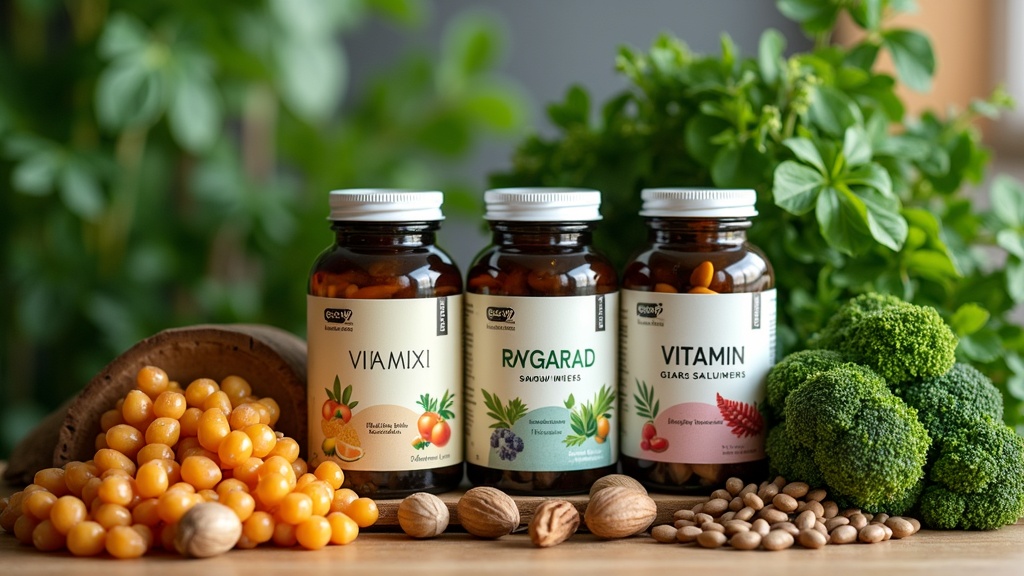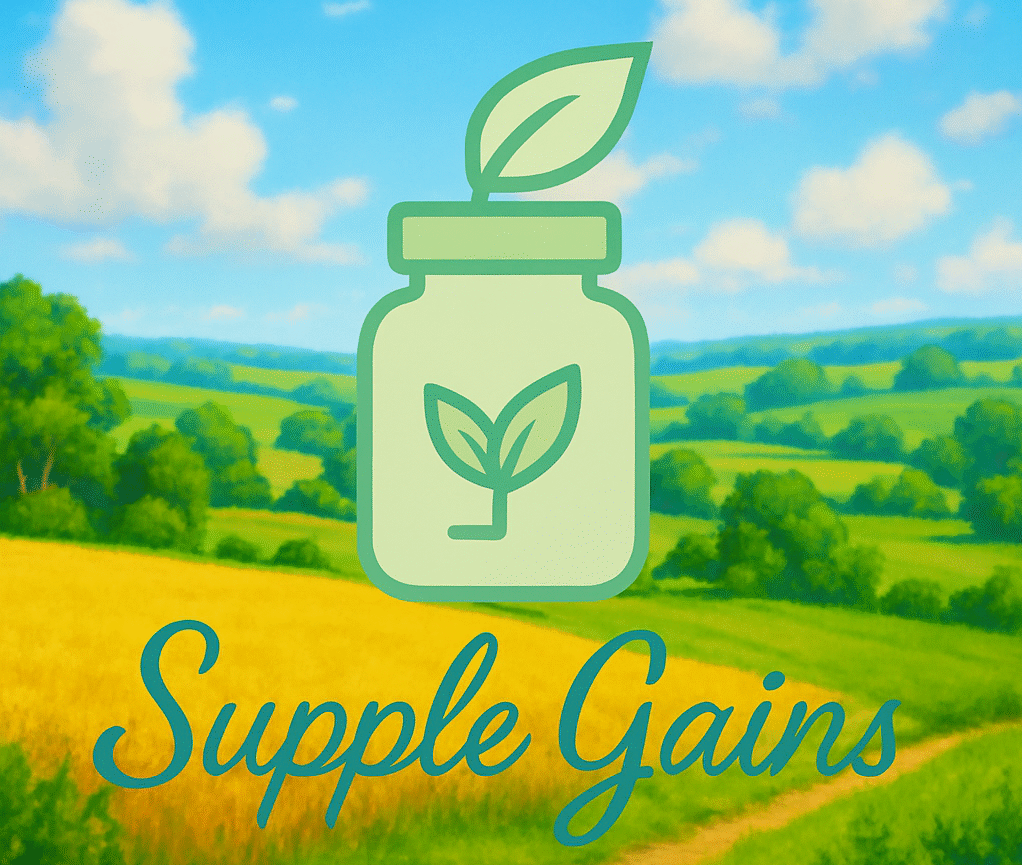If you’re eating a plantbased diet, figuring out how to get all the vitamins and nutrients your body needs can feel a bit confusing at first.
The good news is, most nutrients are easy to find in whole plant foods, but there are a few key vitamins and supplements that usually need a little extra attention.
I’ve learned firsthand how helpful a good supplement routine can be, and I’m here to share everything I know to make things easier for you.

Why PlantBased Diets Need Extra Vitamin Planning
Switching to a plantbased lifestyle brings tons of benefits, from more energy to better gut health.
But some vitamins and minerals are way harder to get from plants than they are from animal-based foods.
This doesn’t make a plantbased diet risky or incomplete; it just means a little upfront planning goes a long way.
Studies published in journals like Advances in Nutrition show that most people following a plantbased diet get enough protein, fiber, and many vitamins.
But B12, iron, omega3s, vitamin D, and a few others are areas worth checking more closely.
Even highly respected plantbased dietitians say adding a few key supplements can be really important for feeling your best over the long run.
Essential Vitamins and Supplements on a PlantBased Diet
While everyone’s needs are a little different, some nutrients deserve extra focus if you’re eating mainly plants.
Here’s a look at the ones every plantbased eater should know about:
- Vitamin B12
- Vitamin D
- Iron
- Omega3 Fatty Acids (DHA/EPA)
- Iodine
- Zinc
- Calcium
Beyond these, it’s a good idea to track your intake of other nutrients like selenium and riboflavin.
While deficiencies in these are less common, occasional monitoring supports overall wellness.
Getting Started: Core Supplements to Consider
When starting a plantbased routine, setting up a supplement base is super useful.
Here’s what’s usually at the top of my list:
- Vitamin B12: This vitamin is the big one. Plants don’t make vitamin B12, so supplementing is important if you don’t regularly eat animal products. B12 helps keep your nerves and red blood cells healthy. Deficiency can sneak up gradually. Most people do well with a weekly highdose tablet or a daily lowdose supplement. Methylcobalamin and cyanocobalamin are both good forms; just make sure the dosage matches your needs.
- Vitamin D: A lot of people, plantbased or not, fall short on vitamin D, especially in winter or if they don’t get much sun. Since natural food sources are limited, supplementing with vitamin D2 or vegan D3 supports bone strength and immune health. D3 made from lichen is a good vegan option if you prefer it over D2.
- Omega3 Fatty Acids: Flaxseeds, chia seeds, and walnuts are great for ALA omega3s, but your body only turns a little of that into the DHA/EPA forms the brain loves. Algae oil supplements give you vegan DHA/EPA, making them a great swap for fish oil.
How to Choose the Right Supplement Brands
With thousands of options out there, picking trustworthy supplements does take some care.
Here’s how I go about it:
- Look for thirdparty testing: Organizations like USP, NSF, or ConsumerLab test supplements for quality and purity. Look for their seals on labels or dig into brand websites.
- Scan the ingredients: Some capsules use gelatin or dairy-based fillers. Make sure the label says vegan or plantbased and always check the ingredient list.
- Look at extra ingredients: Some multinutrient supplements for plantbased diets add more B vitamins, iron, or zinc. Sometimes that helps, sometimes it’s unnecessary. Only buy what you need to avoid excess.
Planning Your Supplements: Quick Guide
Here’s how I build a plantbased supplement stack, laid out in straightforward steps:
- Add Vitamin B12 – Essential for anyone eating mostly or entirely plantbased.
- Include a Vitamin D supplement – Especially if you’re not getting much sun most days.
- Add an algaebased Omega3 for extra brain, kidney, or eye support – Especially helpful if you don’t eat walnuts or flaxseeds daily.
- Track your iron, zinc, and calcium intake – Adjust with food or add supplements if bloodwork or symptoms suggest you’re low. For people with periods, supplementing iron is often more important.
- Remember iodine – Most plantbased milks, sea vegetables, or iodized salt will do. If not, a simple supplement fills the gap.
Common PlantBased Supplement Mistakes
Even with the best intentions, it’s easy to run into a few snags.
Here are some common issues and how I deal with them:
- Forgetting regular B12 supplementation: Going months without B12 can drain your energy, hurt memory, and cause tingling or numbness. Setting a weekly phone reminder to take it makes it nearly automatic.
- Taking too much, too fast: Doubling up on supplements can upset your stomach. Start slow to see what your body tolerates.
- Ignoring symptoms: Hair loss, brittle nails, fatigue, or weakness can hint at a deficiency. It’s smart to get a simple blood test if you feel off.
Vitamin B12
This one needs special attention because deficiency can be hard to spot.
It keeps nerves healthy and supports red blood cell formation.
Plantbased eaters almost never get enough from food alone.
If you’re feeling tired, numb, or notice mood changes, low B12 could be to blame.
A blood test can confirm low levels.
I usually go for a 1,000mcg tablet once or twice a week as much is not absorbed anyway.
Vitamin D
Vitamin D helps you absorb calcium and keeps your bones and immune system strong.
If you live in a northern climate, deal with frequent clouds, or use a lot of sunscreen, running low is common.
Many adults do well with 1,000–2,000 IU daily.
Still, checking your blood levels with your doctor is a good idea if you’re unsure.
Iron
Beans, lentils, and greens have iron, but the iron in plant foods (nonheme) isn’t as easy for the body to absorb as the kind from animal foods.
Eating vitamin Crich foods—like peppers or oranges—alongside your iron-rich meals helps you get more out of what you eat.
For people who menstruate or are pregnant, tracking iron levels and getting checked for deficiency is useful.
If food isn’t enough, take a supplement as recommended.
Omega3 Fatty Acids
Omega3s boost brain health and help tone down inflammation.
Even if you eat flax or chia seeds, the body’s ability to turn them into EPA and DHA—the forms the brain uses—is limited.
Using an algaebased DHA/EPA supplement is a good call, especially for kids or pregnant folks.
Iodine
Iodine is not just for salt.
Seaweed, iodized salt, or a simple supplement can give you what you need.
Lots of plantbased milks and yogurts aren’t fortified, so missing this mineral is easy if you’re not paying attention.
Zinc
Zinc is important for immune function, skin health, and wound healing.
Beans and whole grains contain zinc, but absorption isn’t always as high as from animal foods.
Eating a range of seeds, nuts, and legumes helps, but if you notice slow healing or low immunity, check your zinc status.
Calcium
Calcium is critical for bone health.
Fortified plant milks, tofu, almonds, and leafy greens are go-to sources.
If you can’t get enough from food, a small daily supplement makes sense.
Most adults should aim for about 1,000 mg per day in total.
Real Life Application and Sample Daily Routine
After years of tweaking, here’s what a simple, reliable supplement routine looks like for me:
- Morning: 1,000 IU Vitamin D3, 200 mg Algaebased Omega3
- Breakfast: Fortified nondairy milk for calcium and iodine
- Lunch: Beans or lentils paired with vitamin Crich veggies, pumpkin seeds for zinc
- Evening: B12 (1,000 mcg once or twice a week; I tie it to a day like Sunday so I don’t forget!)
This lineup changes if I’m traveling, spending more time inside, or find out my bloodwork is off.
It’s smart to adjust as circumstances change.
Frequently Asked Questions
Question: What’s the single most important supplement for plantbased eaters?
Answer:
B12 is the main supplement almost everyone on a plantbased diet needs.
There’s really no way to get enough from plants alone.
Question: Can I get everything from food if I pay enough attention?
Answer:
Most nutrients can come from whole foods, but B12 and sometimes vitamin D and omega3s are really hard to get enough of.
Supplements take care of these gaps.
Question: How do I know if I actually need a supplement?
Answer:
Symptoms can help clue you in, but lab tests with a doctor or dietitian make things clear.
They’ll help you adjust the dose and figure out what’s working best for you.
Wrapping Up
Building a smart vitamin plan for a plantbased diet is easier than it seems.
You don’t need to make it complicated. Cover B12, vitamin D, and omega3s, check the rest once in a while, and your health should stay on track.
With a balanced approach, you can enjoy all the benefits of a plantbased lifestyle and keep feeling your best day after day.
